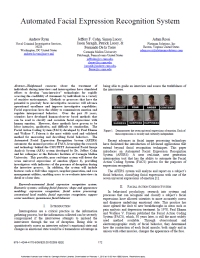Automated Facial Expression Recognition System

People
- Andrew Ryan
- Jeffery F. Cohn
- Simon Lucey
- Jason Saragih
- Patrick Lucey
- Fernando de la Torre
- Adam Rossi
Abstract
Heightened concerns about the treatment of individuals during interviews and interrogations have stimulated efforts to develop "non-intrusive" technologies for rapidly assessing the credibility of statements by individuals in a variety of sensitive environments. Methods or processes that have the potential to precisely focus investigative resources will advance operational excellence and improve investigative capabilities. Facial expressions have the ability to communicate emotion and regulate interpersonal behavior. Over the past 30 years, scientists have developed human-observer based methods that can be used to classify and correlate facial expressions with human emotion. However, these methods have proven to be labor intensive, qualitative, and difficult to standardize. The Facial Action Coding System (FACS) developed by Paul Ekman and Wallace V. Friesen is the most widely used and validated method for measuring and describing facial behaviors. The Automated Facial Expression Recognition System (AFERS) automates the manual practice of FACS, leveraging the research and technology behind the CMU/PITT Automated Facial Image Analysis System (AFA) system developed by Dr. Jeffery Cohn and his colleagues at the Robotics Institute of Carnegie Mellon University. This portable, near real-time system will detect the seven universal expressions of emotion (figure 1), providing investigators with indicators of the presence of deception during the interview process. In addition, the system will include features such as full video support, snapshot generation, and case management utilities, enabling users to re-evaluate interviews in detail at a later date.
Citation

|
Andrew Ryan, Jeffery F. Cohn, Simon Lucey, Jason Saragih, Patrick Lucey, Fernando de la Torre, and Adam Rossi "Automated Facial Expression Recognition System," In IEEE International Carnahan Conference on Security Technology. October 2009. Zurich. [PDF] [BibTex] |
Acknowledgements and Funding
The research and development of the AFERS application is supported by the Technical Support Working Group through funding from the Investigative Support and Forensics subgroup to Platinum Solutions, Inc. Thanks to Dr. Andrew Ryan from the Naval Criminal Investigative Service for his sponsorship of this initiative.
Copyright notice
| Human Sensing Lab |